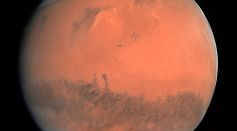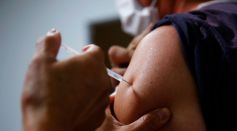Tags: Russia
NASA Calls Russia ‘Irresponsible’ for Blowing up One of Its Satellites Near International Space Station With Missile

Genius Russian Child Claims He is From Mars, Will Save Humanity from Nuclear Destruction; Who Is Boriska Kipriyanovich?
Russia Progress 79 Launch: MS-18 Module Bringing Goods To Space, Smoothly Departs From Kazakhstan
Russian Actress Yulia Peresild Returns Safely Aboard Soyuz MS-18 After Shooting First Movie in Space
Russian Film Crew Finally Reaches International Space Station For An Out-Of-This-World Film Through Soyuz Rocket
Russia Soyuz Rocket Will Beat NASA, Tom Cruise As It Will Soon Launch First Film Crew to Space; Who Will Be Aboard?

Russia Secretly Sends Luna 15 Spacecraft to Far Side of the Moon; What Is This?
How Does a Venus Mission Look Like? Here's How Russia Did It! [WATCH]
Russian Cosmonauts To Conduct More Spacewalks Outside ISS This Week After Grueling 11-Hour Task
Russia Says ISS Will Retire Soon Due to New Cracks Found in the Space Station's Walls

Russia Reschedules Luna-25 Lunar Mission to 2022 As Space Agency Roscosmos Detects Problems During Testing
NASA Debunks Russian Claim of Serena Auñón-Chancellor’s Alleged Breakdown Damaging the Spacecraft, Keeps Astronaut’s Medical Info Private
NASA Reveals International Space Station Tilted 540 Degrees, Far Worse than Just 45 Degrees
Russia Blames Software Error Over ISS Nauka Module Incident; Is It the Most Serious Incident Yet?
Russia's Nauka Module Unexpectedly Tilted ISS: NASA Assures No One Was Endangered, Space Station Regained Its Control
Russia Launches Nauka Lab Module to Space Station After Years of Delays

First Cloned Cow in Russia Opens Hope to Producing Lactose-Free Milk
Junked Starlink Satellite, Falcon 9 Rocket Debris Threatens Russian Space Station Cargo Ship
Ultrastrong Photon-to-Magnon Coupling Achieved Using Multilayered Platform and Superconductors

COVID-19 Mutation: More Than 1,000 Cases Identified in Russia, Is Sputnik V Vaccine Effective to Fight New Strain?
Most Popular

How AI Is Used in Weather Prediction: Smarter Forecasting Through Machine Learning

De-Extinction vs. Conservation Science: Which Approach Protects Biodiversity Most Effectively?

The Future of Clean Tech: Exploring the Next Generation of Renewable Energy Breakthroughs

Geoengineering and Climate Intervention Science: Can We Really Engineer a Cooler Planet?




